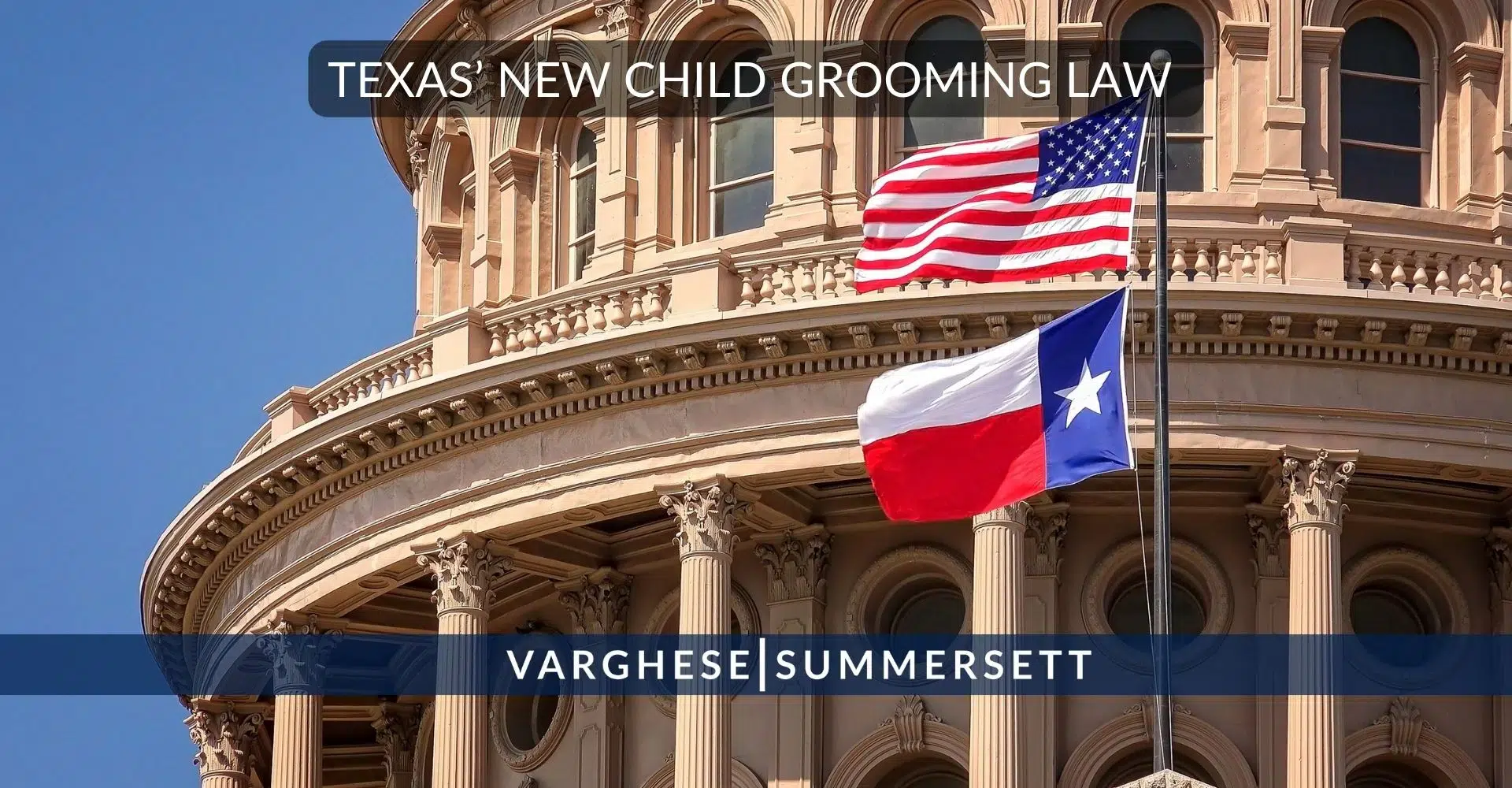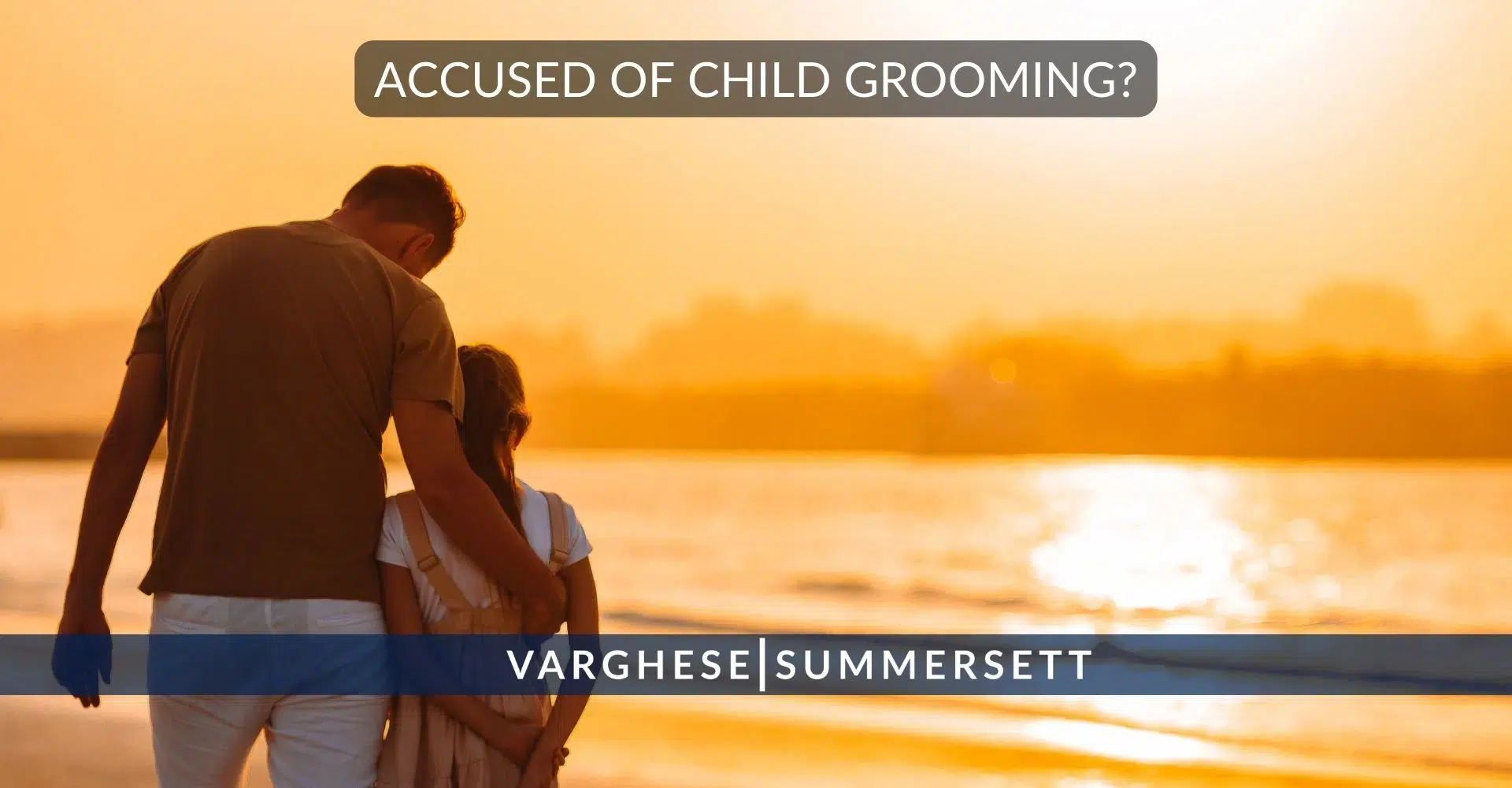Child Grooming | Texas Penal Code Section 15.032
In September 2023, the Texas legislature passed a child grooming law in an effort to protect minors from sexual abuse and exploitation before it happens. This law is aimed at preventing adults from developing connections with children for the purpose of gaining their trust and then sexually abusing or trafficking them.
Under this new law, individuals found guilty of grooming a child under the age of 18 could face up to 10 years in prison. In this article, we explain the new child sex crime law, possible penalties, potential problems – and the importance of securing a highly experienced criminal defense lawyer if you or a loved one is facing a charge of child grooming in Texas.

Child Grooming
What is Child Grooming Under Texas Law?
Child grooming, as outlined in Texas Penal Code Section 15.032, is a serious crime designed to protect children from adults who attempt to exploit them sexually. This law focuses on the preparatory stages, meaning it addresses actions taken before any actual sexual offense occurs. It’s a felony, with penalties that can range from a third-degree felony (up to 10 years in prison and a $10,000 fine) to a second-degree felony (up to 20 years and a higher fine) if the person has prior convictions for certain sexual offenses involving children.
“Child grooming” refers to the process by which an adult establishes a trustful relationship with a child, and sometimes with the child’s family, with the intention of later engaging in sexual abuse, exploitation, or trafficking. This process often involves a series of manipulative behaviors that may include:
- Building Trust and Rapport: The abuser may initially present themselves as a friendly, harmless individual to gain the child’s trust. This can involve showing special attention, understanding, and sympathy towards the child.
- Testing Boundaries: Gradually test and push the boundaries of appropriate behavior, often starting with seemingly innocent touches and escalating to more overtly sexual behavior.
- Isolation: Efforts to isolate the child from friends, family, or peers, thereby making the child more dependent on the abuser for companionship and attention.
- Secrecy: Encouraging the child to keep their relationship secret, often under the guise of it being a special bond that others wouldn’t understand.
- Material or Emotional Bribery: Offering the child gifts, treats, or privileges. This can also include fulfilling the child’s needs or desires and making the child feel indebted or special.
- Filling a Needed Role: The abuser might position themselves as a mentor, benefactor, or protector, especially in situations where the child lacks these figures in their life.
- Desensitization to Touch and Sexual Topics: Gradually introducing sexual content or physical contact in a way that seems normal or accidental, reducing the child’s inhibitions and normalizing inappropriate behavior.
- Creating Dependency: Making the child feel that they need the abuser, whether emotionally or materially, thus creating a sense of dependency.
- Threats and Manipulation: As the abusive relationship develops, the abuser may use threats, guilt, or manipulation to keep the child silent and compliant.
- Communication Control: Monitoring or controlling the child’s communications with others to maintain control over the child’s relationships and interactions.
These grooming behaviors are often subtle and insidious, making them difficult to detect early on.

Texas’ New Child Grooming Law
The law states that a person commits child grooming if, with the intent to commit a sexual offense, they knowingly try to persuade, induce, entice, or coerce a child under 18 to engage in conduct that would either constitute such an offense or make the child a party to it. The covered sexual offenses include those under Chapter 43 (Public Indecency), Chapter 20A (Sexual Performance by a Child), Chapter 21 (Indecency and Sexual Contact), and Chapter 22 (Assaultive Offenses).
You can read the entire statute here.

Problems with the Texas Child Grooming Law
Texas Penal Code Section 15.032 faces several potential legal challenges due to its wording and scope. The statute, which aims to criminalize grooming behaviors toward children, contains language that critics argue is problematic from multiple legal perspectives.
The primary concerns include:
The statute’s use of ambiguous terms like “persuade,” “induce,” and “entice” may violate the void-for-vagueness doctrine. Under the Fourteenth Amendment’s due process requirements, a law must provide fair notice of prohibited conduct and prevent arbitrary enforcement. The current language may fail this constitutional test.
The law could be considered overbroad, potentially criminalizing innocent interactions. A mentor giving gifts or a relative showing affection might technically fall under the statute’s definition of grooming, even without sexual intent.
The lack of clear knowledge or intent requirements creates uncertainty about what actions might be considered criminal. For example, is buying a child a birthday present or showing interest in their personal life considered “an attempt to persuade” them? Without clarification, these everyday interactions could be subject to legal scrutiny.
These ambiguities may create chilling effects on beneficial adult-child relationships. Adults might avoid volunteering, mentoring, or other positive interactions with children out of fear of prosecution.
Law enforcement and prosecutors may struggle to differentiate between actual grooming behaviors and benevolent relationships, potentially leading to false accusations and wrongful arrests.
These issues collectively raise significant First Amendment and due process concerns that could form the basis for constitutional challenges to the statute.
Punishment for Child Grooming in Texas
In Texas, the charge of child grooming is a third-degree felony, punishable by 2 to 10 years in prison and a maximum $10,000 fine.

It’s important to point out that probation or deferred adjudication probation is also a possibility. The Texas Code of Criminal Procedure allows both judges and juries to grant probation for child grooming – as long as the sentence is less than 10 years and a deadly weapon was not used or displayed.
Sex Offender Registration Not Required – Yet
Child grooming has not been added to the list of offenses that require sex offender registration under Chapter 62 of the Texas Code of Criminal Procedure. However, the legislature can add it at any time. You can read more about sex offender registration here.
Statute of Limitations for Texas Child Grooming
Child grooming in Texas carries a three-year statute of limitations, which means a prosecutor has three years to bring charges against an individual.
Child Grooming Defenses
While facing child grooming charges can be terrifying, several defense strategies can be used depending on the specific facts and circumstances surrounding the case. It’s essential to consult with a skilled defense attorney experienced in handling child sex crimes to determine the best approach. Some possible defenses include:
Lack Of Intent
To be convicted of child grooming, the prosecution must prove that the defendant had a specific intent to sexually abuse or exploit the child. If there is no evidence of this intent, it may be possible to argue that the defendant’s actions were misinterpreted or misunderstood.
Insufficient Evidence
Prosecutors must prove every element of a child grooming charge beyond a reasonable doubt. If there’s insufficient evidence to support one or more elements, the defense can fight to have the charges dropped or take it to trial and convince a jury to find you not guilty.
It’s important to remember that the best defense strategy will depend on the unique circumstances of each case. Consulting with an experienced North Texas defense attorney is crucial for understanding the available defenses and developing an effective strategy.

Arrested for Child Grooming? Contact Us.
If you have been accused of child grooming in Fort Worth, Dallas, or the surrounding areas, it’s imperative to have the best possible defense attorney in your corner. Not only are you facing possible jail time and a fine, but a conviction can have lasting consequences on your personal and professional life. At Varghese Summersett, we will do everything in our power to produce the most favorable outcome possible. Here’s how we can help:
- Expert Case Evaluation: Our team is made up of board-certified criminal attorneys and former prosecutors with extensive experience handling child sex crime cases. We will thoroughly review all the facts and circumstances of your case. This involves analyzing the evidence, identifying weaknesses in the prosecution’s claims, and strategizing the best defense approach tailored to your situation.
- Challenge the New Law: As mentioned, child grooming is a new Texas law, which hasn’t been tested in court yet. We will challenge the prosecution every step of the way.
- Negotiating Plea Deals: If it’s in the best interest of our clients, we will aggressively negotiate with prosecutors to secure the most favorable outcome possible. This can result in reduced charges or even the possibility of alternative dispositions, which can significantly decrease your exposure to punishment.
- Strong Courtroom Representation: We are fearless and aggressive trial attorneys known for producing favorable outcomes in even the most challenging cases. We will do everything within our power to challenge every aspect of the prosecution’s case and provide a solid defense on your behalf should your case go to trial.
- Protection of Your Rights: Throughout the legal process, we will ensure that your rights are upheld. Any procedural mistakes or rights violations by law enforcement can be grounds for case dismissal or reduced charges.
- Support and Guidance: Beyond the legal defense, our team provides compassionate support, ensuring you understand each step of the process. We’re here to answer any questions, address concerns, and provide reassurance during this challenging time.
At Varghese Summersett, we recognize the gravity of child grooming charges and their profound impact on a person’s life, liberty, and livelihood. Our approach is a combination of aggressive representation and compassionate counsel. When you choose us, you’re not just hiring a defense attorney but securing a dedicated advocate committed to protecting your future. Call 817-203-2220 now for a free consultation with a North Texas child grooming lawyer.




